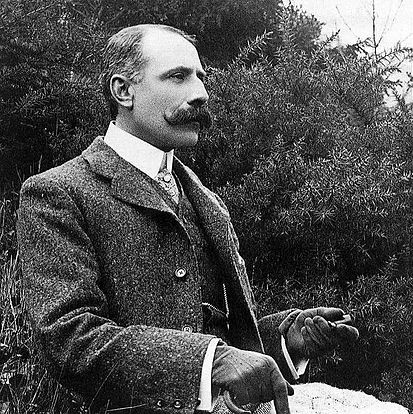
When I lived in England, everyone loved and talked about the music of Edward Elgar (1857-1934). Elgar is right up there with George Frideric Handel among the island’s musical luminaries. So imagine my surprise when I moved back to America and found that very few people–even classical music lovers–had ever heard of this remarkable composer.
Elgar was a product of his time, with a career that straddled the twilight of romanticism with the dawn of modernism. Technically he falls within the period of twentieth-century music, but his style drew inspiration from nineteenth-century models.
In Elgar there is a juxtaposition of the innocence and pride characteristic of pre-WWI Britain, combined with the masculine beauty of the Edwardian period. Even when his music is at its most heart-breakingly sweet, it never loses the sense of manly stature. It is romanticism without gush, beauty without sentimentalism, manly pride without bravado.
Elgar’s Cello Concerto in E Minor, written in the aftermath of the Great War, seems to embody a painful longing for a bygone age. It is a complex amalgam of melancholy and triumph, surrender and imperialism, longing and acceptance, lyricism and dissonance, ostentation and innocence. In this work, it is almost as if we can hear the mature composer longing for a return to the simplicity of an earlier era (an era embodied in the innocent charm of his Salut d’Amour), but with a wisdom that has been wrought through pain—a wisdom that knows that the disasters of century’s second decade can never be reversed.
I have listened to this work dozens of times (including two live performances), but it is still full of surprises me, and it still brings tears to my eyes.
In 1994, Yo-Yo Ma performed this work with the Baltimore Symphony Orchestra. This was Yo-Yo Ma at his best. Enjoy!
Further Reading


